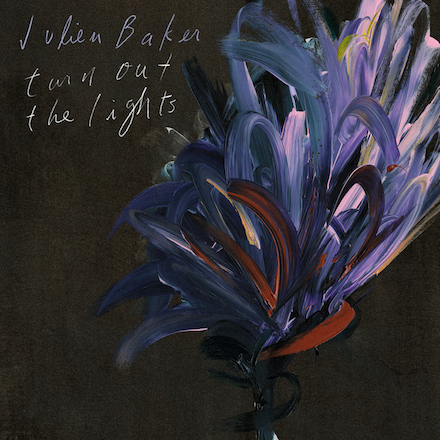
BY STEVE ERICKSON | For an artist who has only released two albums, out lesbian singer/ songwriter Julien Baker has an astonishingly assured vision. She wrote all the songs on her second album, “Turn Out the Lights,” produced it, and plays the main instruments on it. Her production and the album’s arrangements sound relatively spare even when they venture into adding strings; every song starts out based around Baker accompanying herself on guitar and/ or piano.
Without the use of more elaborate instrumentation on some songs, “Turn Out the Lights” might sound like a demo tape — it almost never uses percussion — but I don’t mean that as a criticism. Her debut album, released on the indie label 6131 three years (when she was 18) and reissued by her current label Matador last spring, is said to be even more spare.
Baker’s music is centered around her voice, which is a very flexible instrument. It serves the varying tones of her lyrics and dynamics of her music. She sometimes starts off singing in a matter-of-fact voice and builds to a melodramatic crescendo. Her music video for the album’s second single, its title track, demonstrates that. It begins with Baker walking slowly through a field and ends with her running as a fire burns in the background.
“Turn Out the Lights” centered on her own songs, her voice, and her piano and guitar
While Baker is openly lesbian, I’m not sure one would guess that simply from listening to “Turn Out the Lights.” Her lyrics describe intense relationships, but she never mentions the gender of her lovers. She is also a Christian, who has said in one interview that she attends church every day. Her music is not “Christian rock” and she is being marketed to a secular audience, but her lyrics are full of religious imagery. The song title “Televangelist” might leap out at listeners who knew this aspect of Baker’s identity, but there’s one seemingly overt reference to the intersection — and possible conflict — between being a lesbian and Christian homophobia on the song “Happy To Be Here”: “If you swear that it’s true then I have to believe what I hear evangelicals say on TV.” On this album, her faith seems more central to her work than her sexuality: there are a number of casual references to going to church and the Holy Ghost.
There are some definite precursors to Baker’s music. “Turn Out the Lights” reminds me of a cross between Tori Amos’ debut album “Silent Earthquakes” and Fiona Apple. In many ways, these are very facile comparisons: all three women are singer/ songwriters whose music is piano-based (althougBaker also uses guitar frequently as counterpoint). But her tendency to build a great deal of intensity out of material that might seem mellow in someone else’s hands recalls both Amos and Apple. Apple’s early music started out relatively pop-oriented — and she became notorious for her video “Criminal,” made when she was 19 and looked 15, which put her in deliberately creepy and sexualized positions — but her last album went into a far different direction, with a jazz influence on both her vocals and the drumming.
Both Amos and Apple have used their sexuality in various ways as part of their lyrical content and image. Amos sang the anti-rape acapella song “Me And a Gun,” but also expressed a sexual bravado on parts of “Silent Earthquakes.” Baker completely refrains from such attitudes. In her video for “Appointments,” the first single from “Turn Out the Lights,” she wears a white T-shirt and black jeans as she is followed by a troupe of dancers going about her daily rounds. The video ends with her alone on a beach. “Appointments” is actually quite dirge-like, and Baker’s music is often dark, even if it works through these emotions. “Hurt Less” is a love song that opens by acknowledging reckless, if not suicidal, thoughts — Baker declares she didn’t wear a seat belt in the past because she didn’t really care if she lived or died — but by the end of the song, her new partner has convinced her that life is worth enough to use them.
Matador Records seems to be giving Baker a big enough push that it released two music videos before the official release of “Turn Out the Lights,” as well as re-releasing her debut album and putting out her single “Funeral Pyre” last spring. She played a concert at New York’s Town Hall on the October 27, the day this album was released. That said, I have a hard time picturing her music fitting any current terrestrial radio format besides “Adult Alternative” (aka “Triple A”). Despite the fact that one can obviously place Baker in a tradition of female singer/ songwriters, her beautiful voice and music have a real emotional force all her own.
JULIEN BAKER | “Turn Out the Lights” | Matador Records | Release date: Oct. 27 | $17.24 at store.matadorrecords.com





































